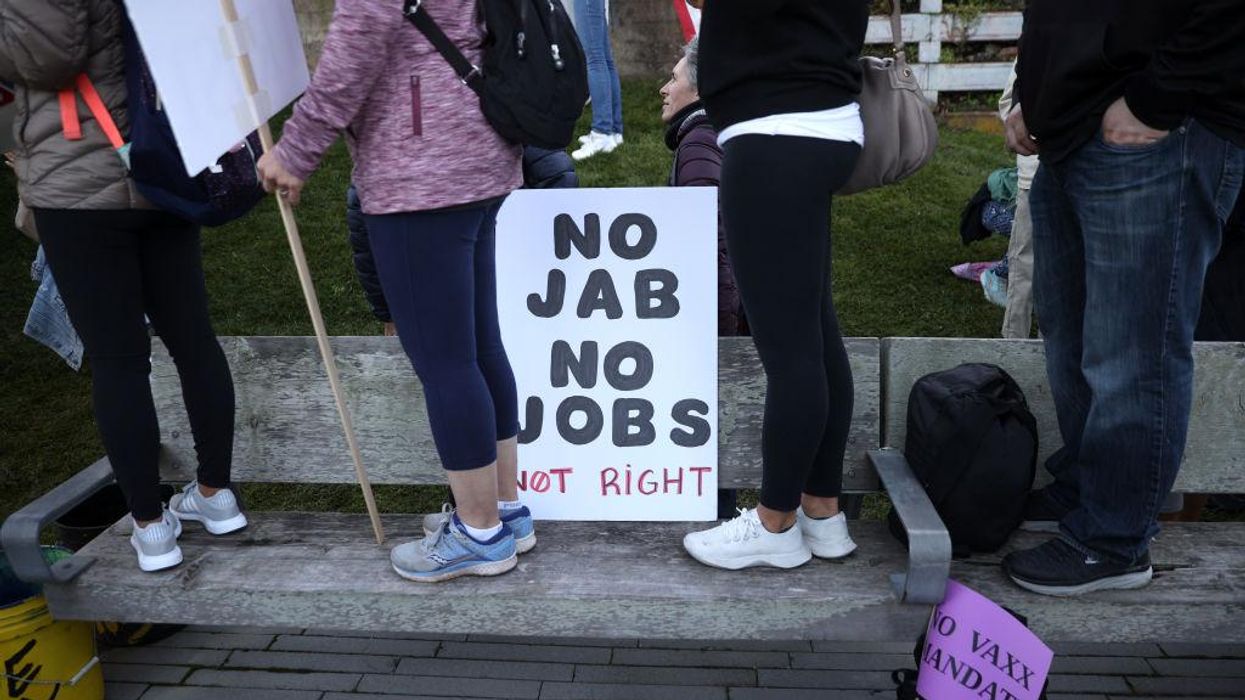
Justin Sullivan/Getty Images

The U.S. Centers for Disease Control and Prevention does not have any records of an unvaccinated person with a COVID-19 reinfection transmitting the virus to another person and admitted that it does not collect such information.
The CDC's admission came on Nov. 5, in response to a Freedom of Information Act request filed by attorney Elizabeth Brehm. The New York-based legal firm for which Brehm works, Siri & Glimstad, has performed millions of dollars of legal work on behalf of groups opposed to vaccine mandates.
In her request, Brehm asked for "documents reflecting any documented case of an individual who: (1) never received a COVID-19 vaccine; (2) was infected with COVID-19 once, recovered, and then later became infected again; and (3) transmitted SARS-CoV-2 to another person when reinfected."
In response, CDC FOIA officer Roger Andoh informed Brehm that the agency does not keep records related to her inquiry.
"A search of our records failed to reveal any documents pertaining to your request," Andoh wrote. "The CDC Emergency Operations Center (EOC) conveyed this information is not collected."
Siri & Glimstad attorney Aaron Siri said in a Substack post that the FOIA request was filed on behalf of the Informed Consent Action Network, a nonprofit that questions the safety of COVID-19 vaccines and has been accused of spreading misinformation.
"ICAN wanted to see proof of any instance in which someone who previously had COVID-19 became reinfected with and transmitted the virus to someone else," Siri wrote. "The CDC's incredible response is that it does not have a single document reflecting that this has ever occurred. Not one."
The question of whether an unvaccinated person who has recovered from COVID-19 can get sick again and infect other people is relevant to the political debate over vaccine mandates.
President Joe Biden's administration, through the Occupational Safety and Health Administration, has mandated that companies with more than 100 employees force their workers to get vaccinated against COVID-19 or submit to weekly testing. Companies that fail to comply by Jan. 4 could face up to $13,653 in fines per violation.
The president has also required federal workers and contractors to be vaccinated against COVID-19 or face termination. These workers do not have a testing option.
Both vaccine mandates are currently being challenged in court.
Supporters of the mandates say they are necessary to overcome vaccine hesitancy, that by making people choose between getting vaccinated and losing their jobs, they will choose to get the jab and bring the nation closer to the goal of protecting the community from the virus.
"The vaccine requirements that we started rolling out in the summer are working," Biden said last month, after vaccination rates had increased by more than 20% since private businesses began implementing mandates even before the federal government acted.
Critics say that the mandates fail to take into account the protection against COVID-19 offered by natural immunity the body develops after infection and unfairly punish unvaccinated people who are already immune to the disease.
"The CDC is actively crushing the rights of millions of naturally immune individuals in this country if they do not get the vaccine on the assumption they can transmit the virus," Siri said.
"Everyone, the naturally immune or otherwise, who wants to get vaccinated and boosted should be free to do so. But nobody should be coerced by the government to partake in any medical procedure," he added.
Doctors say that natural infection unquestionably provides protection from COVID-19, but caution that the degree of that protection varies from person to person.
"The problem with natural infection is that the immunity really varies from person to person. It can depend on a whole bunch of different factors — how severe their illness was, whether they have any immunocompromising conditions, whether they're on certain medications," Virginia Dr. Rebekah Sensenig explained to local news outlet WVEC-TV.
She said that vaccines are effective at preventing severe illness and death from COVID-19 and that the protection offered by the shots can complement a person's natural immunity.
Dr. Marc Siegel, a professor of medicine and medical director of Doctor Radio at NYU Langone Health, recently wrote in an op-ed for The Hill that the debate over which form of immunity is better is political, not scientific.
"From a medical point of view, there is no real battle between vaccine-induced immunity versus natural immunity from infection, though some news reports and social media posts make it appear to be so," he said. "Both create a significant immune response, although neither appear to be durable, and they also augment each other. Arguing that one is better than the other is politics, not medicine. Better to recognize both as useful to prevent spread, especially as breakthrough infections are occurring at an increasing rate."
Republican lawmakers have introduced legislation that would require federal agencies to consider naturally acquired immunity from previous COVID-19 infections in any coronavirus regulations.
"There's ample scientific evidence from numerous peer-reviewed studies that natural immunity from previous COVID-19 infection is effective, durable and long-lasting," Tennessee Republican Rep. Diana Harshbarger, who introduced the Natural Immunity is Real Act, said.
"We are over a year and a half into the COVID-19 pandemic and the Centers for Disease Control and Prevention (CDC) has failed to recognize the effectiveness of natural immunity," Rep. Jeff Van Drew (R-N.J.), a co-sponsor of the bill, said.
"We know vaccines work, but natural immunity could be equally or similarly as effective in certain individuals," he added.
"If the CDC would devote time into its research, we would have robust, evidence-based research that could help America finally move on from this virus."